FAMILY MEAL: On Culture and Queer Hospitality
How two creatives built Casa Magu AND made it more than just a destination
Can you believe it’s June? We’re queer everyday in my house but to appease the masses, HAPPY PRIDE! In today’s FAMILY MEAL, we cover boutique hospitality, cultural identity, and constructing queer spaces in Mérida, Yucatán.
-
I met Mario nearly three years ago when he joined the board of the Queer Food Foundation. Since then, we’ve both lived what feels like a decade’s worth of seasons, but today, we’re reconnecting to celebrate Mario: a creative force, a compassionate hospitality consultant, and overall, a great human.
I delve into Mario’s latest chapter, where he has built a boutique hospitality brand rooted in care, cultural respect, and queer hospitality with his partner, René. I’m so excited to share this interview and to learn what it means to create space, both literally and figuratively, for community.
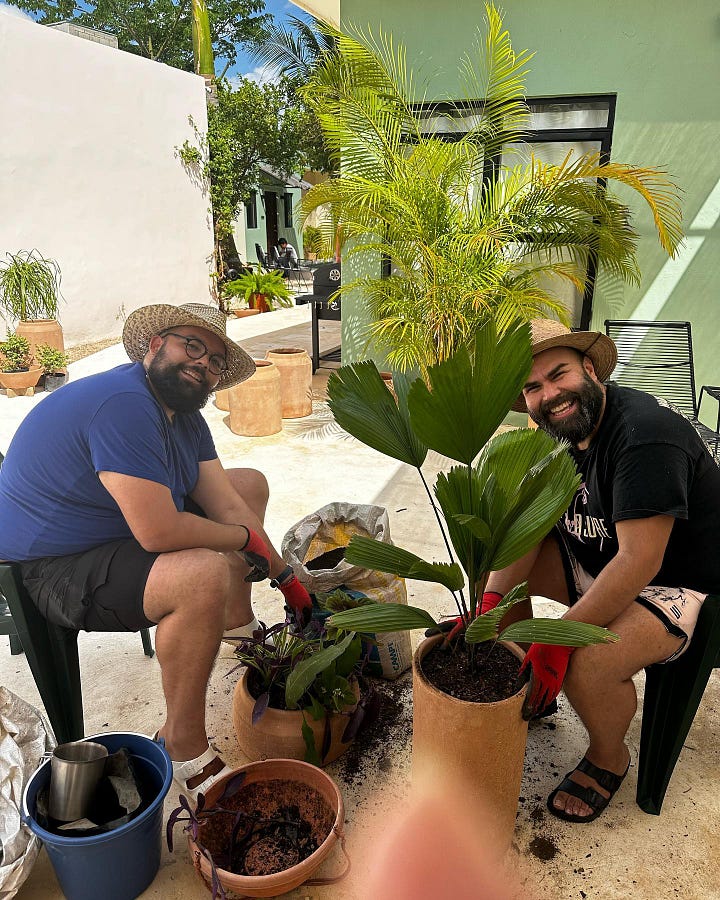
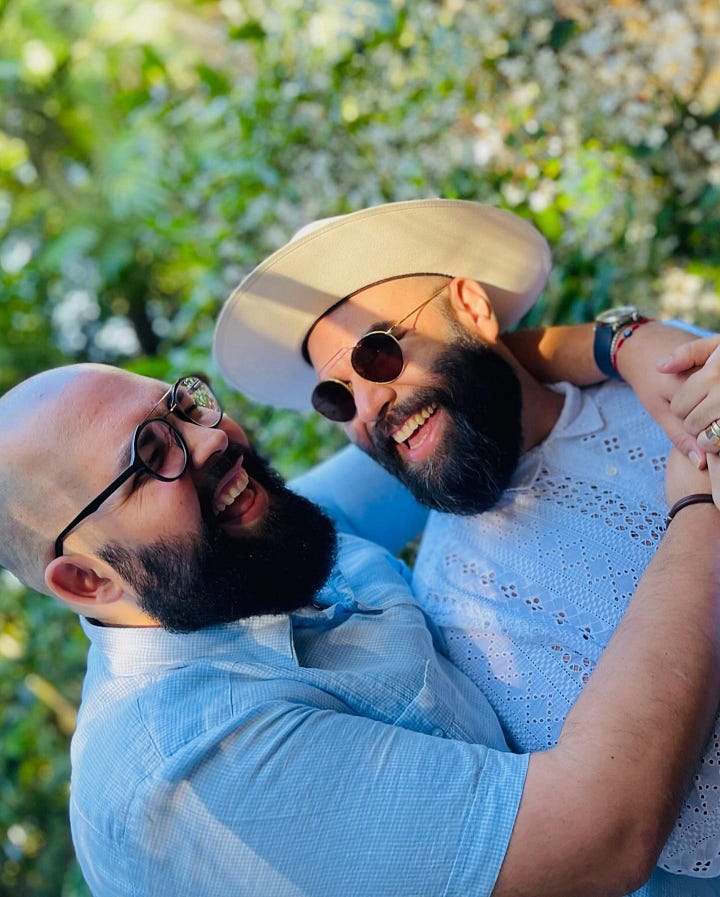
—
Gabrielle: Can you tell me a little about Casa Magu Mérida? It feels like such a place rooted in intentional hospitality.
Mario: For us, Casa Magu is really about connection. When we created this space, we didn’t just want it to be beautiful or comfortable; we wanted it to feel intentional. Especially because of where we are. The Yucatán Peninsula is rich with Mayan influence, and we wanted that to be reflected in every part of the home. Everything in the house is handmade—about 80 to 90% of what you see is locally crafted, and at the very least, made by hand. That was really important to us. It’s not just design for design’s sake, it’s about honoring the legacy of artisanship in Mexico. What we say is handmade is a legacy worth exploring. For example, a lot of the pieces are made from henequén, a natural material native to this region that used to be used for rope before plastic existed. It has this beautiful, leathery quality, but it’s made from plants. There’s so much incredible history here, and we wanted to put that at the forefront.
My partner René is Mexican and a fashion designer—and maybe a frustrated interior designer too—and he worked closely with local carpenters to create custom pieces for the house. The chairs, the soap dishes, the coasters, everything has a story, and everything is thoughtfully made.
Gabrielle: You and your partner are both queer. How does that influence the hospitality component at Casa Magu?
Mario: So much. It influences everything. The way I communicate with guests, the level of detail, the intentionality of every interaction. We’re not trying to recreate a luxury hotel. We’re trying to create human interaction, something meaningful. We wanted it to be a space created for travelers, by travelers, and I think there are tiny details throughout. The breakfast that I do for the guests. It's light on purpose, because one of the things we experienced is that the food can be quite heavy, and so having this sort of fresh take on breakfast, usually on the second day. Our guests are like, “Oh my god, your breakfast is the best.” I use local fruit, I make my own jam, so I don't have waste from the food that I buy. And to me, it's the easiest thing, and I do it out of necessity. It becomes second nature, you know? And so I think part of that is how we identify, and also what is easy for us. It’s the survival skills that we’ve sort of act on from our queer experience, that resilience. It all feeds into how we host. That means meeting people where they are and giving them a thoughtful experience. We’ve had to learn how to create safe spaces for ourselves our entire lives, and now, we get to do that for others.
Gabrielle: What’s been the most surprising lesson since opening Casa Magu?
Mario: Honestly? The smallest details matter the most. We put a steamer in each room, and guests rave about it. Also, the layout of the house really works. And the pool is really special; it’s one of the reasons people love staying here. The bungalows allow people to have privacy and autonomy while still feeling connected to the property. And being a B&B, there’s the possibility of that awkwardness about the quirks or things in a house that you're like, “How does this coffee machine work?” We’re here for that.
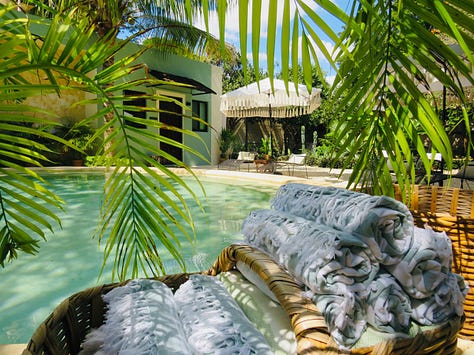
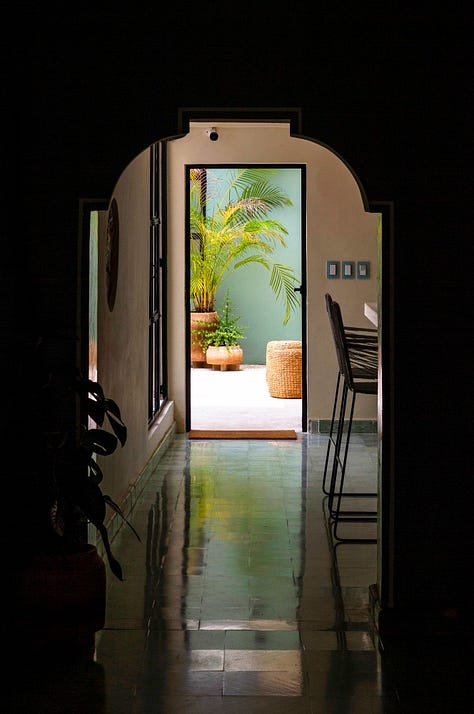
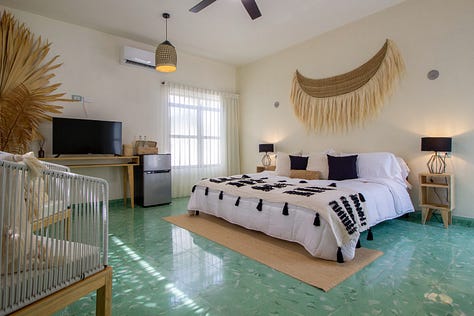

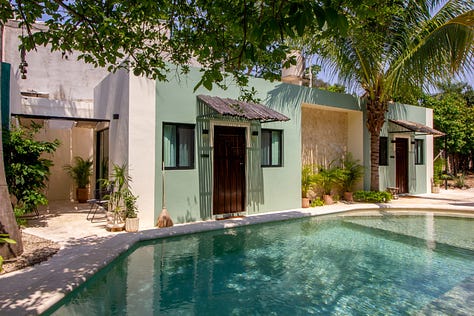
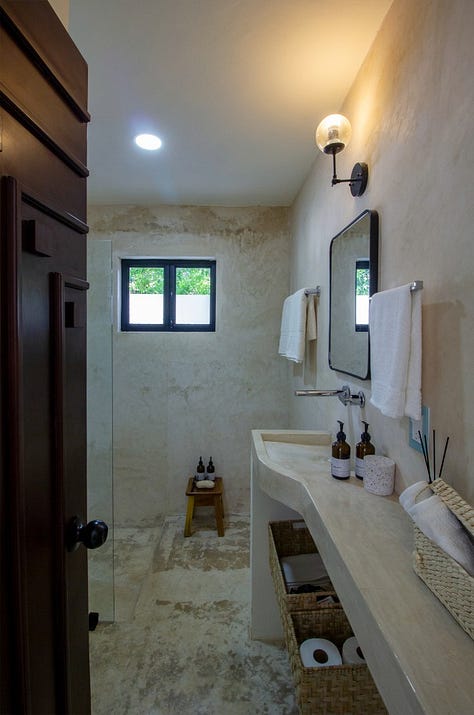
Gabrielle: What does it look like to create a space that honors place and identities of you and your partner?
Mario: This region has a very different approach to life. Their custom, dances, and their colloquialness are very different than the Aztec influence in other regions. We want to pay homage, or at least understand and take into account those traditions—see where they create hammocks and get cochinita locally. So, there are still a lot of old traditions and customs here. I find that if I share, or the guests seem interested, I also take on clues for how to approach. Because, like, sometimes they are not having it, and I'm like, “Oh, was breakfast good?" Okay, great.” But if there is anybody who's here to explore like the ruins, like Chichén Itzá, we get to have amazing conversations with our guests — they're here in our home.
Casa Magu is also close enough to a beach, but we're not going to go crazy. So you get a much better interaction. We're also in a colonial city that is about architecture and art, and so we do get the whole gamut when it comes to a more educated traveler—they want to visit the ruins or want to see Cenotes, and they're not here for the resort experience. They want to take in this culture. The cuisine here is so special too: panuchos, cochinita pibil, things you won’t find elsewhere in Mexico. The Yucatan has Caribbean, Spanish, Taíno, and Mayan influences. I saw a lot of similarities with my Cuban culture. There’s also a deep pride in the traditions and customs here, and we want our guests to feel that.
It’s also a very safe and inclusive place. We have a queer community, we have gay parades, gay bars. We go to drag shows and drag cabarets. There's, like, gay cantinas here. So it's very, very fun to, you know, explore, I would say much more chill than Playa del Carmen. It’s special.
Gabrielle: You’ve also transitioned into hospitality consulting. What challenges have come with that?
Mario: The biggest one is that people don’t always understand their market. You have to know who your guests are. And your messaging, how you present the space, has to be consistent. We’ve had clients who want to cut corners or don’t understand why details matter. But authenticity is everything. Guests can feel when something’s not right.
Gabrielle: What’s next for Casa Magu?
Mario: We’d love to eventually move to a bigger house and operate as a four-room boutique. Eventually, take this as a full brand so that, when we do another outpost and get another house, the brand sort of grows with it. We like to say it’s a livable showroom. Guests don’t just stay here, they experience the work of local artisans. Renee is really working on wearables, so a linen line that's inspired by everything that's here. Then we want to be able to add furniture, so that we are able to have an online boutique that is sustained by this hospitality concept. It’s about redefining quality because for so long, handmade work has been undervalued, especially in a world of mass production. That’s what we want people to feel when they walk into Casa Magu. And then through Magu Goods, they can actually take a piece of that home with them. That’s the full-circle moment for us.
Stay at Mario’s and René’s intimate B&B, Casa Magu. Follow Casa Magu and Magu Goods on Instagram. Follow Mario, too.
—
**Special Announcement: PANTRY MAG, a queer food journal, opened submissions for our first issue: ferment/foment. This is a paid opportunity. More information here!**
Things I’ve been into, in no particular order: Happy Pub Day to John Birdsall - I received my copy of "What is Queer Food" and have been loving it (check out the book tour). I’m excited to dive into this by Jaya Saxena. I recently chatted with Jae Bae for a very fun piece coming out soon. My other pieces (Edible and Apartment Therapy) will be out later this month. I’m currently writing for Barsys, a cocktail meets tech company, so if you know someone (or a brand) who would be interested in being interviewed/featured, please reach out to me!
Some brands I’ve been loving: Nepal Tea Collective (I’m addicted to drinking their chai, hot with lemon) and Oddball Jelly (which I will be dolloping their Mango jelly over my passionfruit birthday cake).
Wow, if you made it this far, THANK YOU. I appreciate you. I’d love to hear your thoughts!
In Community,
Gabrielle



👏🏾🫶🏾👏🏾🫶🏾👏🏾it was a pleasure to read! Makes me want to book right away! Well written interview, with questions that were thoughtful crafted and resulting in great responses. Thanks Gabrielle.